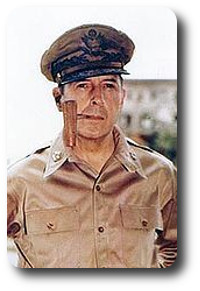Topic: Leadership

General MacArthur's Principles of Leadership
Leadership Principles for the new ADP 6-22; A Monograph by Major Gregory W. McLean, US Army, SAMS, AY 2012-001
 General Douglas MacArthur's principles of leadership are another example of how a leader can briefly explain what is expected from his subordinates to be successful. General MacArthur's principles were written during peacetime operations, but the Army still has to function while not conducting combat operations and his principles focused on garrison activities are useful as well. His principles are a concise way for leaders to understand what should be expected from them.
General Douglas MacArthur's principles of leadership are another example of how a leader can briefly explain what is expected from his subordinates to be successful. General MacArthur's principles were written during peacetime operations, but the Army still has to function while not conducting combat operations and his principles focused on garrison activities are useful as well. His principles are a concise way for leaders to understand what should be expected from them.
- Do I heckle my subordinates or strengthen and encourage them?
- Do I use moral courage in getting rid of subordinates who have proven themselves beyond doubt to be unfit?
- Have I done all in my power by encouragement, incentive, and spur to salvage the weak and erring?
- Do I know by NAME and CHARACTER a maximum number of subordinates for whom I am responsible? Do I know them intimately?
- Am I thoroughly familiar with the technique, necessities, objectives, and administration of my job?
- Do I lose my temper at individuals?
- Do I act in such a way as to make my subordinates WANT to follow me?
- Do I delegate tasks that should be mine?
- Do I arrogate everything to myself and delegate nothing?
- Do I develop my subordinates by placing on each one as much responsibility as he can stand?
- Am I interested in the personal welfare of each of my subordinates, as if he were a member of my family?
- Have I the calmness of voice and manner to inspire confidence, or am I inclined to irascibility and excitability?
- Am I a constant example to my subordinates in character, dress, deportment, and courtesy?
- Am I inclined to be nice to my superiors and mean to my subordinates?
- my door open to my subordinates?
- I think more of POSITION than JOB?
- I correct a subordinate in the presence of others?
These questions/principles are uncomplicated – which is what makes them timeless and so much more useful than hundreds of pages of over-explained values. General MacArthur said "in the end, through the long ages of our quest for light, it will be found that truth is still mightier than the sword. For out of the welter of human carnage and human weal the indestructible thing that will always live is a sound idea." General MacArthur also believed, "It is easy, of course, to overemphasize the influence of machinery in war. It is man that makes war, not machines, and the human element must always remain the dominant one. Weapons are nothing but tools and each has its distinctive limitations as well as its particular capabilities. Effective results can be obtained only when an army is skillfully organized and trained so as to supplement inherent weaknesses in one type of weapon by peculiar powers in others." General MacArthur focused his principles on the human dimension, and understanding your subordinates is one of the most important qualities a leader can have. He also understood leaders must be calm during times of duress, a constant example, and encouraging.

